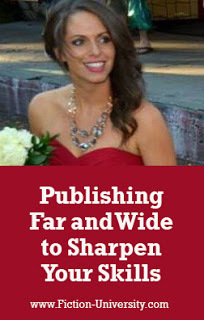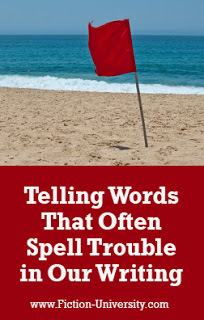Janice Hardy's Blog, page 82
February 16, 2019
Real Life Diagnostics: Putting Subtext Into a Scene
 Critique By Maria D'Marco
Critique By Maria D'Marco Real Life Diagnostics is a weekly column that studies a snippet of a work in progress for specific issues. Readers are encouraged to send in work with questions, and we diagnose it on the site. It’s part critique, part example, and designed to help the submitter as well as anyone else having a similar problem.
If you're interested in submitting to Real Life Diagnostics, please check out these guidelines.
Submissions currently in the queue: Zero
Please Note: As of today, RLD slots are open.
This week’s questions:
1. Can you detect any subtext from Christian's side―that he's interested in Willow, or is it too subtle. OR, is subtle just right for the start of the story. I find the romance genre the most difficult to write, fearing I'll come across as cheesy or too cliché.
2. Anything else I need to drum up or tone down?
Market/Genre: Short story
On to the diagnosis…
Continue ReadingWritten by Janice Hardy. Fiction-University.com

Published on February 16, 2019 05:03
February 15, 2019
Three Ways One Stop for Writers’ Character Builder Tool Will Help Writers
 By Angela Ackerman, @AngelaAckerman
By Angela Ackerman, @AngelaAckermanPart of The Writer’s Life Series
JH: Writers are almost always looking for useful tools to help them develop their stories, and today, Angela Ackerman visits the lecture hall to share her new character-building tool. Please give her a warm welcome.
Angela Ackerman is a writing coach, international speaker, and co-author of the bestselling book, The Emotion Thesaurus: A Writer’s Guide to Character Expression (now a expanded 2nd edition) as well as six others. Her books are available in six languages, are sourced by US universities, and are used by novelists, screenwriters, editors, and psychologists around the world. Angela is also the co-founder of the popular site Writers Helping Writers, as well as One Stop for Writers, an innovative online library built to help writers elevate their storytelling.
Website | Facebook | Twitter | Instagram
Take it away Angela…
Continue ReadingWritten by Janice Hardy. Fiction-University.com

Published on February 15, 2019 04:56
February 14, 2019
Publishing Far and Wide to Sharpen Your Skills, Thicken Your Skin
 By Alythia Brown
By Alythia Brown Part of The Writer’s Life Series
JH: Being a writer encompasses many forms, and not all of them include fiction. Please welcome Alythia Brown back to the lecture hall to share her story about how a wider career path improved her writing--and saved her sanity.
Alythia Brown, repped by BookEnds LLC., is the author of an indie press book you’ve never ever heard of and she wouldn’t even want you to read now. In collaboration with her group of beta readers, she will soon launch ebooks through www.betabaybooks.com. Her skills include naming the neighborhood cats and drawing doodles of chickens to help writers remember grammar tricks.
Website | Twitter | Goodreads | Grammar Chicken
Take it away Alythia...Continue ReadingWritten by Janice Hardy. Fiction-University.com

Published on February 14, 2019 04:02
February 13, 2019
An Easy Tip for Getting Unstuck in a Scene
 By Janice Hardy, @Janice_Hardy
By Janice Hardy, @Janice_Hardy When you get stuck on a scene, you might just need a little push to get you started again.
Last week, I got stuck with a scene. It wasn’t writers block, and I knew what I wanted to write, I just couldn’t get started. I kept looking at the scene and the words didn’t want to come, even though I could picture it in my head.
After quite a few false starts and a lot of deleted paragraphs, I stepped back and tried something I’d never done before.
I broke my scene summary down into smaller tasks and wrote them one task at a time.
Simple as this sounds, it gave me a clear situation to write and I was able ignore everything else in the scene until I was ready for it.
Continue ReadingWritten by Janice Hardy. Fiction-University.com

Published on February 13, 2019 05:50
February 12, 2019
The Six-Figure Master Fiction Plot
 By Laurence MacNaughton, @LMacNaughton
By Laurence MacNaughton, @LMacNaughton Part of the How They Do It Series (Contributing Author)
Ever wish you could write a novel in just a matter of weeks . . . and then sell it for good money?
Lester Dent knew how. He wrote his first novel in just 13 days. Over the course of his career, he wrote nearly 200 novel-length stories, mostly for the Doc Savage series. Throughout the 1930s and 1940s, he wrote a book nearly every month.
He also crammed the pages of pulp fiction magazines with short stories cranked out under various pen names. During the Great Depression, while legions of writers were starving, he boasted that he made $18,000 a year with his writing. In today's terms, that's more than $250,000 a year.
How did he do it? He used a very specific formula. He called it his “Master Plot.”
Continue ReadingWritten by Janice Hardy. Fiction-University.com

Published on February 12, 2019 05:07
February 10, 2019
Sunday Writing Tip: Get Rid of Your Crutch Words
 By Janice Hardy, @Janice_Hardy
By Janice Hardy, @Janice_Hardy Each week, I’ll offer a tip you can take and apply to your WIP to help improve it. They’ll be easy to do and shouldn’t take long, so they’ll be tips you can do without taking up your Sunday. Though I do reserve the right to offer a good tip now and then that will take longer—but only because it would apply to the entire manuscript.
This week, cut or revise your crutch words—those pesky and weak words you tend to overuse.
Crutch words are words or phrases we tend to overuse—our go-to words we can slap down and not think too hard about. You might notice you use a certain dialogue tag, or mannerism a lot, or you always describe something a certain way.
Every writer has their own set of words they use over and over, and it can vary from book to book. For example, mine are just, only, and so, and I’ve had eyes widen and fell into step beside me appear way too much in various books.
Continue ReadingWritten by Janice Hardy. Fiction-University.com

Published on February 10, 2019 06:04
February 9, 2019
Real Life Diagnostics: Is This Romantic Thriller Opening Working?
 Critique By Janice Hardy, @Janice_Hardy
Critique By Janice Hardy, @Janice_HardyReal Life Diagnostics is a weekly column that studies a snippet of a work in progress for specific issues. Readers are encouraged to send in work with questions, and we diagnose it on the site. It’s part critique, part example, and designed to help the submitter as well as anyone else having a similar problem.
If you're interested in submitting to Real Life Diagnostics, please check out these guidelines.
Submissions currently in the queue: One
Please Note: As of today, RLD slots are booked through February 16.
This week’s question:
Is this opening working?
Market/Genre: Romantic Thriller
Note: We have a newbie today, who was brave enough to send their first attempt at an opening scene. Please bear that in mind when offering feedback.
On to the diagnosis…
Continue ReadingWritten by Janice Hardy. Fiction-University.com

Published on February 09, 2019 05:41
February 8, 2019
Send up the (Red) Flag: Telling Words That Often Spell Trouble in Our Writing

By Janice Hardy, @Janice_Hardy
This week's refresher Friday revisits (and updates) one of my favorites--locating red flag words for telling, not showing. Enjoy!
Show, don't tell is one of those pieces of advice that nearly every writer hears at some point, and not just when we're just starting out. Even when we know how to fix it (use strong nouns and verbs), we can't always find the problem in our work to fix it.
This frustrated me back in the day, and I set off to figure out how to find told prose. After a lot of study and analyzing, I found a series of "red flag words" often found in told prose. Not every word found meant the prose that contained it was told, but when I received feedback that a section sounded told, one of these red flag words almost always appeared.
Let's look at a quick round-up of the different types of red flag words commonly found in told prose.
Continue ReadingWritten by Janice Hardy. Fiction-University.com

Published on February 08, 2019 03:00
February 7, 2019
Follow Me to the Playground! The Merry-Go-Round Way of Writing
 By Tiffany Reisz
By Tiffany ReiszPart of The Writer's Life Series
JH: Common "wisdom" says writers should write every day, but that's not always feasible (or even accurate). Tiffany Reizs takes the podium today to share why keeping momentum going is more important that writing every day.
Tiffany Reisz is the USA Today bestselling author of The Red , an NPR Best Book of 2017. She has written over twenty novels that have been published in over a dozen languages and twenty countries. Her books have won a Lambda Award, a RITA®Award, and two RT Editor’s Choice Awards. She is married to New York Times bestselling author Andrew Shaffer ( Hope Never Dies ). They live in Lexington, Kentucky with their two cats. The cats are not writers.
Website | Goodreads | Facebook | Instagram |
Take it away Tiffany...
Continue ReadingWritten by Janice Hardy. Fiction-University.com

Published on February 07, 2019 03:00
February 6, 2019
5 Ways to Turn Off Your Inner Editor and Get More Writing Done

By Janice Hardy, @Janice_Hardy
Our inner editor is an enemy to our muse—here’s how to shut it up.
I think writers would get a lot more written if there was a first draft keyboard without a delete or backspace key, and a mouse that didn’t let you click on anything but the menus. Sure, those first drafts would be a mess, but we’d be free to just type and let the words flow without the ability to fix them—so there’d be no inner editor telling us to go back and tweak it.
It’s only natural yo want to to write the best draft possible, but sometimes the creative process needs to be set free to flow unhindered to get anywhere. Constantly stopping to tweak or fix a word can sap our creative energy and lower our productivity.
Now, I’m not saying you have to go crazy every writing session and make a mess, but setting aside some time to write without that inner editor nagging you is a liberating experience. The more you get used to it, the less that editor shouts in your ear while you’re trying to work. Maybe try it one or two times a week and see how it goes. Or do it for a week and see how it affects your productivity.
Continue ReadingWritten by Janice Hardy. Fiction-University.com

Published on February 06, 2019 03:00



